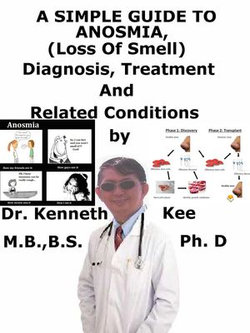
-
Books
-
Education
-
eBooks
-
Audio Books
-
Film & TV
-
Calendars, Diaries & Stationery
-
Giftshop

This book describes Anosmia, Diagnosis and Treatment and Related Diseases
Since the start of Covid-19 pandemic, a lot of infected Covid-19 patients have developed the loss of smell or anosmia.
Anosmia is the partial (hyposmia) or total loss of the sense of smell.
This loss of the sense of smell may be… more
This book describes Anosmia, Diagnosis and Treatment and Related Diseases
Since the start of Covid-19 pandemic, a lot of infected Covid-19 patients have developed the loss of smell or anosmia.
Anosmia is the partial (hyposmia) or total loss of the sense of smell.
This loss of the sense of smell may be temporary or permanent.
While some persons have anosmia by birth, others may slowly lose the sensation to smell.
Frequent disorders that irritate the nose’s lining, such as allergies or a cold, can cause temporary anosmia.
Anosmia normally is not serious, but it can have an intense effect on a person’s quality of life.
People with anosmia may not be able to totally taste foods and may lose their interest in eating.
This can cause weight loss or malnutrition.
Anosmia can also result in depression since it may reduce one’s ability to smell or taste pleasurable foods.
More serious disorders that affect the brain or nerves, such as brain tumors or head trauma, can produce permanent loss of smell.
Old age occasionally produces anosmia.
When a person sniffs on something, air entering the nose containing the odor molecules comes in contact with the olfactory nerve endings accountable for the sense of smell.
These nerves are present on the nasal epithelium internally.
When stimulated by odor molecules, these nerves transmit signals to the brain.
Upon arrival in the brain, it processes this olfactory information and interprets it into an odor that the person can identify.
One of the most frequent causes of anosmia is nasal congestion that often happens due to a cold, sinus infection, allergy, or bad air quality.
Anosmia is often produced by a swelling or blockage in the nose that stops odors from getting to the top of the nose.
Blockage of the nasal passages
Loss of smell can happen if something is physically blocking the passage of air into the nose:
Sinonasal tumors
Nasal polyps – minor noncancerous progressions in the nose and sinuses, blocking the nasal passage.
Bone deformities within the nose or a crooked nasal septum
Irritation to the mucus membranes lining the nose
Sinus infections
Common colds
Smoking
Influenza
Allergies (allergic rhinitis)
Chronic congestion not related to allergies (non-allergic rhinitis)
COVID-19
A cold is the most frequent cause of partial and temporary loss of smell.
In these cases, the anosmia will depart on its own.
Brain or Nerve Damage:
When the pathways through which receptors present inside the nose transmit signals through the nerves to the brain are injured, they produce loss of sense of smell.
Brain or head injury
Old age - sense of smell, vision, hearing weaken with time
High blood pressure medicines
Brain surgery
Long-term alcoholism
Stroke
Brain tumors
Illicit drugs (cocaine) and toxins
In rare cases, people are born without a sense of smell due to a genetic disorder.
The primary symptom of anosmia is the loss of smell.
Persons born with anosmia may not even recognize they have it.
The loss of smell can be an early sign of neurodegenerative diseases, such as Alzheimer’s or Parkinson’s disease.
Anosmia is normally diagnosed by:
CT scans
MRI scans
X-ray of the skull
Nasal endoscopy to look inside the nose
The treatments that may help resolve anosmias produced by nasal irritation are:
Decongestants
Antihistamines
Steroid nasal sprays
Antibiotics
Decreasing exposure to nasal irritants
The best treatment is to use a professional scent therapy program
TABLE OF CONTENT
Introduction
Chapter 1 Anosmia
Chapter 2 Causes
Chapter 3 Symptoms
Chapter 4 Diagnosis
Chapter 5 Treatment
Chapter 6 Prognosis
Chapter 7 Hyperesthesia
Chapter 8 Pruritis
Epilogue
This item is delivered digitally
Thanks for reviewing A Simple Guide to Anosmia (Loss of Smell). We will process your review. Accepted reviews will be posted within 3-7 business days.
Be the first to know, stay up to date with what's trending and get staff picks in your inbox with our newsletter


Public: Allow anyone to view or shop your List
Private: No one can view or shop your List
We have kept your A&R details for your new Angus & Robertson account
We also noticed that you have previously shopped at Bookworld. Would you like us to keep your Bookworld order history?
We also noticed that you have an account on Bookworld. Would you like us to keep your Bookworld details, including delivery addresses, order history and citizenship information?
Share This eBook